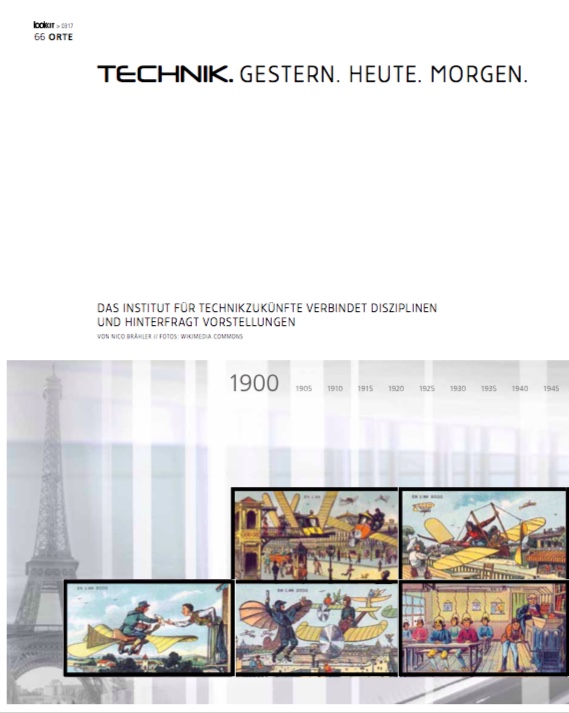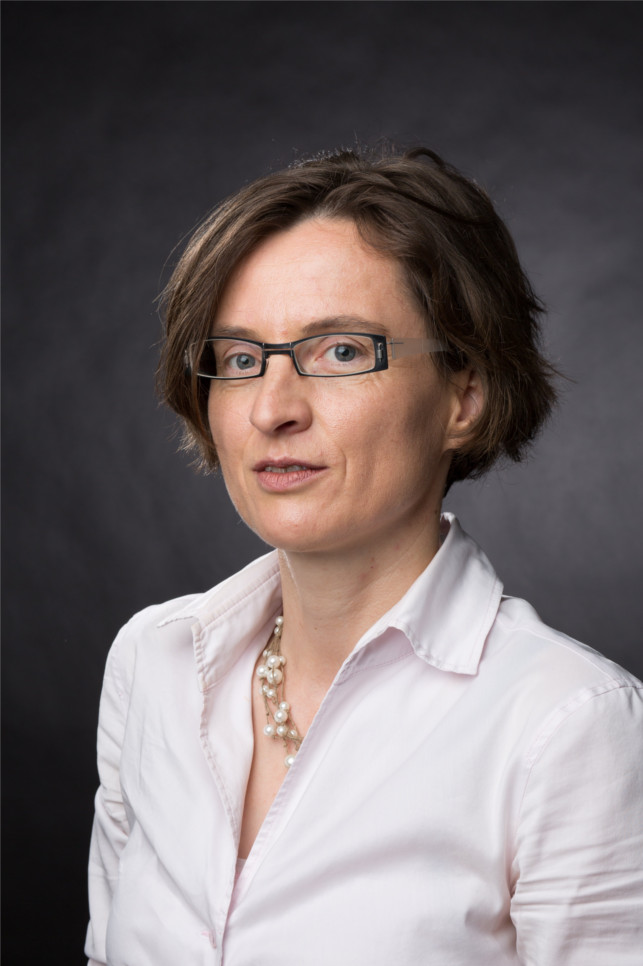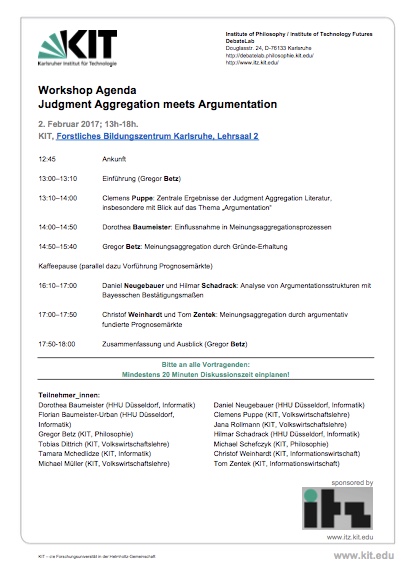OpMAP installation at ZKM
The new exhibition “Open Codes – Living in Digital Worlds” at the ZKM/Center for Art and Media in Karlsruhe was opened on October 19th 2017.
The installation „OpinionMap – What should one eat?“ was created by the Institute of Theoretical Informatics and the Institute of Technology Futures/Institute of Philosophy.
Algorithmic methods to analyze and illustrate complex debates are researched and implemented in the OpMAP-Project. The interactive installation shows a “map” of eating habits, one country for each opinion, and gives visitors the possibility to define their own location on the map by answering questions. Depending on the answers, the size of the countries can change.
For more information see the ZKM website or the OpMAP website.
The Institute of Technology Futures combines disciplines and critically analyzes concepts
“The newly established KIT Institute of Technology Futures (ITZ) is divided into the central of ce of Managing Director Dr. Alexandra Hausstein, the Institute of Philosophy, and the Institute of History. The ITZ is to study in an interdisciplinary manner the relationships of technology, society, and culture as well as technology futures. Each discipline will use its own approach.”
New professor for Techno-Cultural Studies: Prof. Dr. Heike Weber
In June 2017, Heike Weber was appointed professor of „Techno-Cultural Studies“ at the Institute of Technology Futures at Karlsruhe Institute of Technology (KIT). Her research focuses on technology in everyday life and the role of users in the process of technological change, the interrelatedness and entanglement of technological innovations and established (infra)structures and value systems, as well as, the topics of garbage, waste and recycling.
„Techno-Cultural Studies“ combine approaches from STS, History of Technology, Environmental History and Cultural Studies in order to analyse interactions and interdependencies between technology, society, culture and environment.
Previously, Heike Weber was professor of Technology, Environmental and Gender History at the Interdisciplinary Centre for Science and Technology Studies (IZWT) at Wuppertal University, other positions include, among others, the Hermann von Helmholtz Centre for Cultural Techniques (HZK) at Humboldt-Universität zu Berlin (HU), the Munich Centre for History of Science and Technology (c/o Deutsches Museum), the Smithsonian (NMAH, Washington D. C.) and the EHESS (CRH, Paris).
ITAS Workshop on Philosophy of Models in Engineering Design, 27.06.17 – 28.06.17
Organizers
- Prof. Dr. Dr. Rafaela Hillerbrand, ITAS & Institute for Philosophy, KIT
- Prof. Dr. Claudia Eckert , The Open University, visiting professor at KIT in summer 2017
Description
Motivation: Engineers interact with their products and processes largely through models. Consequently model-based reasoning takes center stage in shaping our technological future. However engineers only rarely reflect about the nature of these models and how technical possibilities and actions are affected by the models’ properties and characteristics. Thereby models in engineering describe not only the product, i.e. the designed artefact, but also the generating process (via so-called process models). At the same time the models also shape and create both the artefact as well as the process. This clearly distinguishes them from scientific models that primarily aim to describe a certain target system.
The importance of modelling has been steadily increasing over the past decades with improving computer technology. However a further step change is expected in the coming decade with the increasing prominence of industry 4.0, which brings together engineering from different engineering disciplines. Big data will also play an increasing role through the introduction of sensors monitoring and directing the use of the product and connecting products together. One of the engineering approaches to this is model-based system engineering where the aim is to model and simulate product properties and behavior from the onset. However underlying questions about the nature and influence of models have rarely been asked.
Over the last decades or so, there has been a growing body of literature on models in the sciences. Much less research has been done on models on engineering design. The workshop is supposed to fill in this gap.
Focus: With this workshop we aim to bring together design scholars, engineers and philosophers who have worked on model-based reasoning. The guiding question is as to what knowledge can be derived from models in engineering? And building on that: What actions do models afford? These questions are of relevance beyond the model debates as they may shed some light on the classical question as to what distinguishes scientific from engineering practice.
Consequently relevant subquestions include, but are not limited to the following issues
- How, if so, do results derived from models differ from more descriptive knowledge by means of normativity, functionality, and other?
- What are the relations between these aspects?
- What is the relation of process models to product models and thus to the designed artefact?
- How do process models structure the knowledge-generation in engineering design?
- What is the role of tacit knowledge in using a model and utilizing models-based result?
- What role can or should ethical or social values play in engineering modelling?
- What problems arise from a wrong/incomplete understanding of the role of model?
- Given that the epistemic status of model is interpreted differently by individuals and communities, what are the substantive barrier that arise for model based system engineering?
Model-based reasoning takes center stage in shaping our technological future. Particularly in the fast developing field of system engineering and in what has been coined industry 4.0 models play a central role. We thus think that an enhanced understanding of what type of engineering knowledge can be created by models and how (and whether) models afford certain technological actions is thus one central question when reasoning about technological futures as done at ITZ. Thereby the focus of the workshop is on epistemic issues, but also ethical ones (via non-epistemic values in modelling) will be touched and thus the question as to what kind of technological future we want to create.
The presented research will be published an edited volume with Springer.
Details
For more information about program, speakers and abstracts of the workshop please visit the ITAS-Website.
The Institute of Technology Futures as an Umbrella Institute
On 01.04.2017, the Institute of Technology Futures has been founded as an interdisciplinary institute with focus on technology futures. It unites the sub-institute of philosophy, the sub-institute of history and, in the future, the sub-institute of sociology. These institutes are active as independent institutes in research and teaching in their respective disciplines beyond their mutual work at the Institute of Technology Futures.
The goal of the work done at the Institute of Technology Futures is to create a well-founded understanding of the mechanisms and requirements of our modern society in connection with modern technology and technology futures.
The main research foci of the sub-institutes lie in the following areas:
Philosophy
Professorships and fields of work:
- Natural philosophy and Philosophical Anthropology (Prof. Mathias Gutmann)
- Political philosophy and Argumentation Theory (Prof. Gregor Betz and Prof. Michael Schefczyk)
- Philosophy of Technology and Philosophy of Science (Prof. Armin Grunwald and Prof. Rafaela Hillerbrand)
Research foci at the Institute of Technology Futures:
- Theory and Hermeneutics of Science and Technology
- Argumentative Analysis of Descriptive and Normative Discourses
History
Professorships and fields of work:
- History of the technical-scientific civilisation (Prof. Marcus Popplow)
- Techno-Cultural Studies (Prof. Heike Weber)
Research foci at the Institute of Technology Futures:
- Longterm trajectories of historic discourses of technology
- Analysis of non-reflective dimensions, cultural-historical aspects as well as divergent chronologies of development, employment and use of new technologies.
- Reconstruction of historic options on the use of technology
- Adaptions of concepts of the “applied history” on the reflexivity of technology futures.
Sociology
Professorships N.N.
Research Foci at the Institute of Technology Futures:
Dr. Alexandra Hausstein, branch:
- Sociology of science studies of the integration of the disciplines and institutional implementation of “responsible innovation”
- Mapping of controversies and debates and illumination of interests, normative concepts and the realm of expectations of discourses on technology futures
- Discourses on innovation
Workshop – Judgement Aggregation meets Argumentation
Interdisciplinary workshop „Judgement Aggregation meets Argumentation“,
February 2nd, 2017 at KIT
Sometimes, disagreements can not be solved by plausible arguments. Despite this, how is it possible to come to a joint decision anyway? Which role can arguments play in this process? These questions will be discussed by economists, computer scientists and philosophers in an interdisciplinary workshop organized by Professor Gregor Betz at the Institute of Technology Futures.



